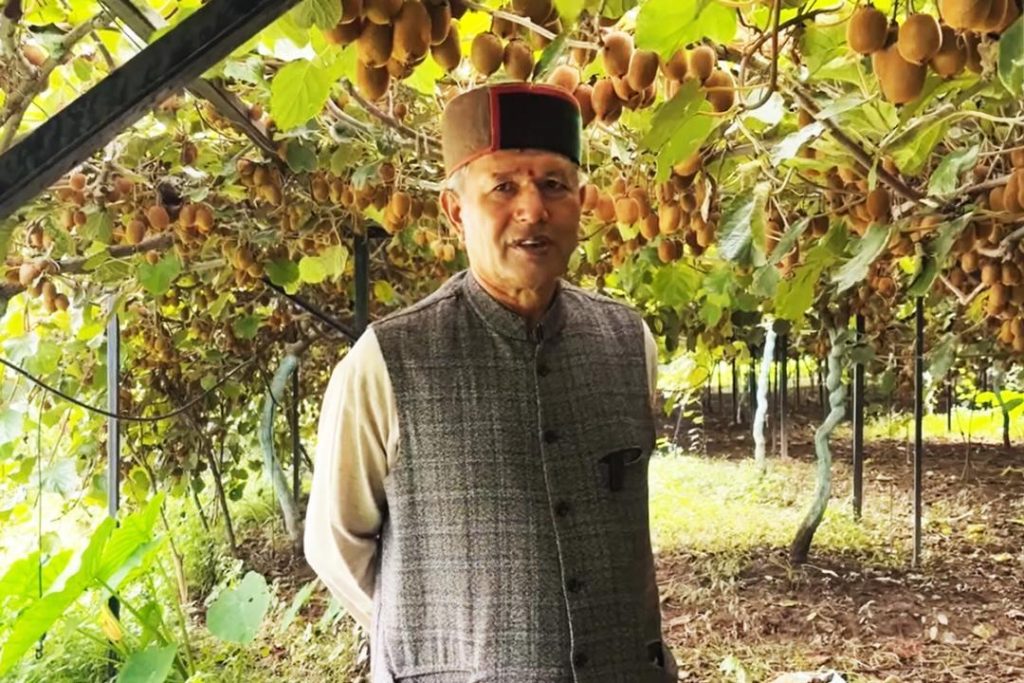
Solan Farmer Earns ₹21 Lakh/Acre with Organic Kiwi Farming
In a remarkable achievement, Pratap Bharnal, a farmer from Solan, Himachal Pradesh, has earned a staggering ₹21 lakh per acre by adopting organic kiwi farming. His journey began in 2017, when he decided to diversify away from apples due to declining rates. With a small starting point of 100 saplings, Pratap has now expanded his kiwi farm to 400 plants, yielding an impressive average of 52 kg every season.
Pratap’s success story is a testament to the potential of organic farming and the importance of diversification in the agricultural sector. In this blog post, we will delve into the details of his journey, the challenges he faced, and the strategies he employed to achieve such remarkable success.
The Beginning
Pratap, a third-generation farmer, has been involved in farming for over three decades. Initially, he focused on growing apples, which were a staple crop in the region. However, over the years, the rates of apples began to decline, making it challenging for him to sustain his farm. In 2017, he decided to diversify and explore new opportunities.
After conducting extensive research, Pratap was drawn to kiwi farming, which was relatively new to the region. He was impressed by the crop’s potential and the growing demand for organic kiwis in the market. With a small starting point of 100 saplings, Pratap began his organic kiwi farm in 2017.
The Challenges
Starting a new crop, especially one as niche as kiwi farming, comes with its set of challenges. Pratap faced several obstacles, including:
- Climate and Soil Conditions: Kiwi plants require a specific climate and soil condition, which can be challenging to maintain in the Himalayan region. Pratap had to adapt his farming techniques to suit the local conditions.
- Pest and Disease Management: Kiwi plants are susceptible to pests and diseases, which can significantly impact yields. Pratap had to develop effective pest and disease management strategies to protect his crops.
- Marketing and Sales: Kiwi farming is a relatively new concept in the region, and Pratap faced challenges in marketing and selling his produce.
The Strategies
To overcome these challenges, Pratap employed several strategies, including:
- Soil Testing and Fertilization: Pratap conducts regular soil testing to ensure the soil is fertile and rich in nutrients. He uses only cow dung manure as a natural fertilizer, which has significantly improved soil health and reduced the use of chemical fertilizers.
- Integrated Pest Management (IPM): Pratap uses a combination of natural methods to manage pests and diseases, such as introducing beneficial insects, spraying neem oil, and practicing crop rotation.
- Diversification: Pratap has diversified his farm by growing multiple varieties of kiwis, including Hayward, Golden, and Red. This has helped him to spread the risk and increase his yields.
- Market Linkages: Pratap has established strong market linkages with local consumers, wholesalers, and retailers. He participates in local markets and fairs to promote his kiwis and build a loyal customer base.
The Results
Pratap’s hard work and dedication have paid off in a big way. Last season, he harvested an impressive 21,600 kg of kiwis, earning him a staggering ₹21 lakh per acre. This is a remarkable achievement, considering the initial investment was relatively small.
Pratap’s success has not only improved his financial prospects but also contributed to the local economy. His farm has created employment opportunities for local laborers, and his organic kiwis are in high demand among health-conscious consumers.
Conclusion
Pratap Bharnal’s success story is a testament to the potential of organic kiwi farming and the importance of diversification in the agricultural sector. By adopting sustainable farming practices, Pratap has not only improved his yields but also contributed to the local economy and environment.
As the demand for organic produce continues to grow, farmers like Pratap will play a crucial role in meeting this demand. His story serves as an inspiration to other farmers, encouraging them to adopt innovative farming practices and explore new opportunities in the agricultural sector.
Source:






